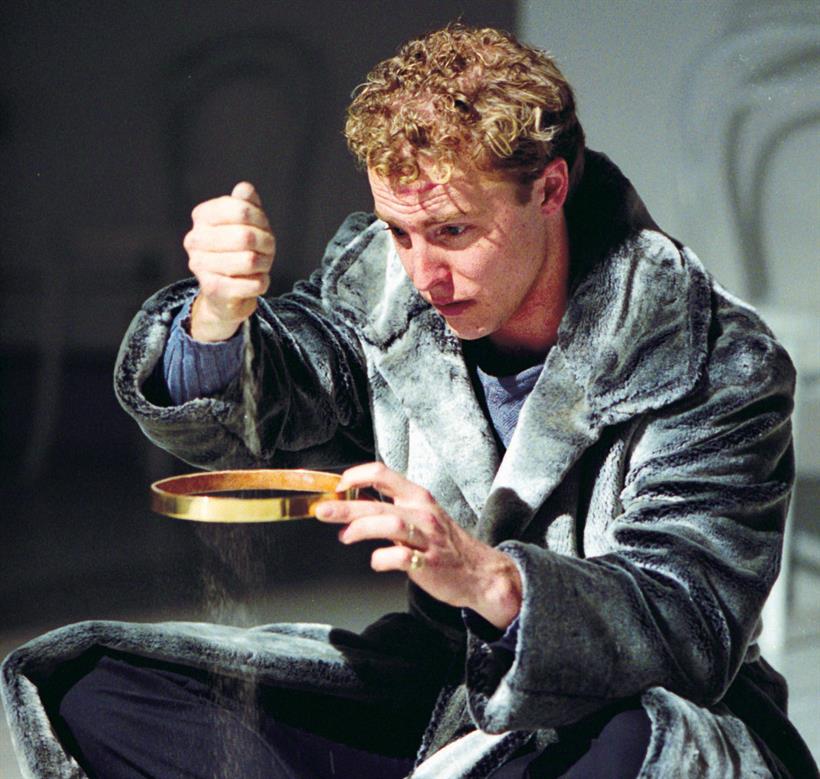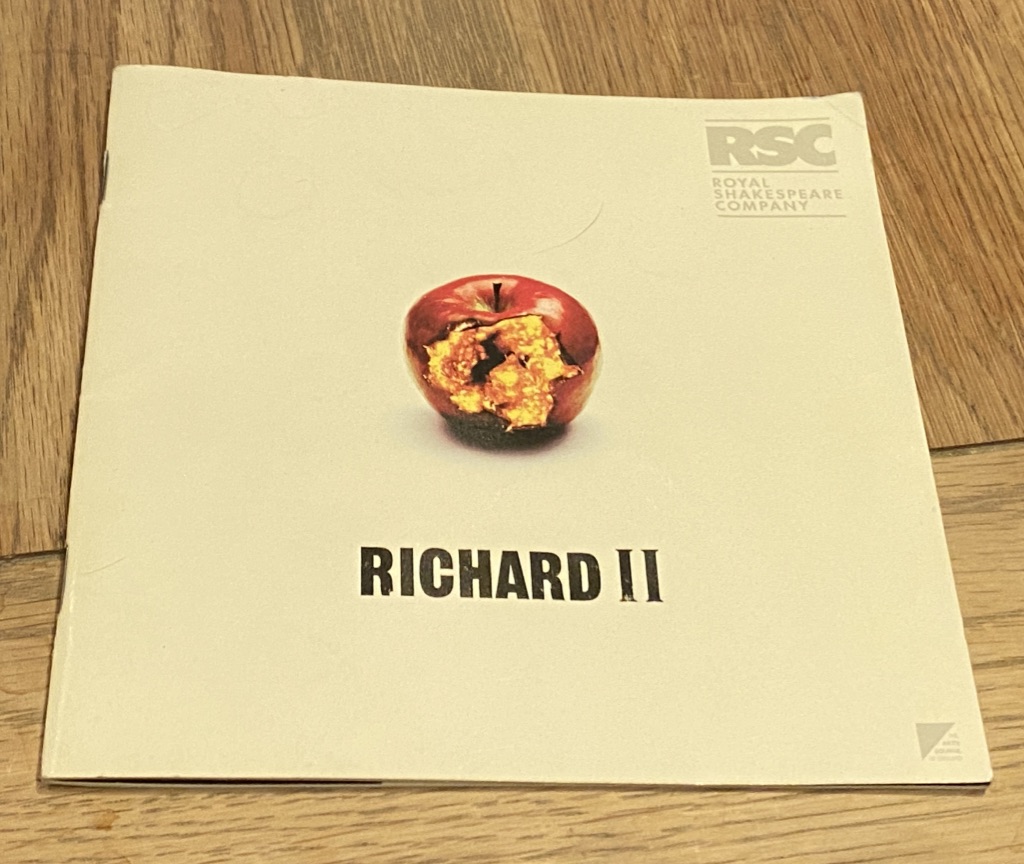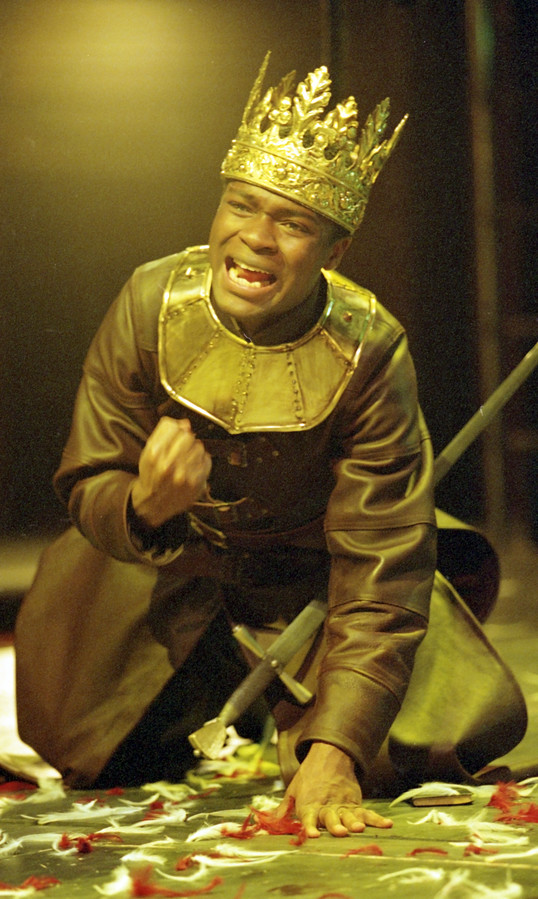Theatre That Changed My Life, Week 4: This England : The Histories (2000-1)
Before Covid, we talked endlessly in the public sphere about ‘Englishness’. But before Brexit, before the Irish backstop, before the Scottish IndyRef, even before the opening of the devolved Scottish and Welsh parliament buildings, the Royal Shakespeare Company was the first place that invited me to think about Englishness – and its corollary, Britishness.
In March 2000, Steven Pimlott’s production of Richard II opened at The Other Place in Stratford-upon-Avon. There was always something odd about this production starting in the RSC’s smaller space. It starred the already-established Sam West (by then, he was Leonard Bast in Howard’s End to proper adults and ridiculously enough, King Caspian of the Dawn Treader to my generation of children). More importantly, it was the first production in the RSC’s continuous sequence of all 8 of Shakespeare’s Plantagenet History plays. The cycle had been heavily trailed: this was the first time in the RSC that all eight were to be staged in sequence, and the productions shared a massive ensemble cast which worked together for two years. It felt counterintuitive to raise the curtain with such a small-scale opener.
When the production moved nine months later to the Barbican, then the RSC’s London home, I saw Richard II at the even smaller Pit Theatre and I finally understood. This was intimate Shakespeare as psychodrama – something that at fourteen I’d never seen before. In its articulation of the opening themes of the two Henriads, it was also somehow stripped down and elemental. Looking back, it always feels like Rheingold to the RSC’s Ring Cycle: a short, mythic overture to something that spirals outward into complexity as the series develops. Richard II is one of Shakespeare’s shortest history plays: as an amuse-bouche, it works.
West, of course, was made to play the role. Appropriately for the play’s first half, he was gifted with the blond curls and aristocratic hauteur of a young Sun King; the second half was his chance to show the poetic intelligence and understanding of Shakespeare’s language required to shine as the morbid philosopher-come-lately. Pimlott directed him as Hamlet in later in the same season. Both performances carried the same air of a golden future wasted, against a backdrop of Blairite moral corruption. (The Independent’s Rhoda Koenig compared him to Boris Johnson, then editor of The Spectator: ‘This is a Richard who has gone to Eton, and regards that as sufficient preparation and justification for ruling the universe’ – prescient for the year 2000.) One thing I remember clearly about West’s performance is that in his voice, the rhyming couplets that make up Richard II never tripped off the tongue too lightly; were never cloying. The best productions of this play make us hear the poetry, but simultaneously allow us to believe we’re hearing natural speech.
I had queued up for my matinee ticket. The moment I left the auditorium, I found a payphone – remember those? – and called my parents and brother. They’d tried to book for the entire histories cycle, but the small space of the Pit had made it impossible to get tickets for Richard II. But this was a production they simply had to see, I told them, so as I was already in the building I was going to darn well stand in line all afternoon in the returns queue for them. They came; they loved it; we ended up seeing the entire cycle together. Most importantly – and this is perhaps why the production matters most to me – my eleven-year-old brother loved it. It was for him, too, a key moment in a lifelong love of theatre. And so when I think back to Richard II and the entire history series, I think about all the times that theatre has been something I’ve shared with family.
The full cycle is now best remembered for David Oyelowo’s performance as Henry VI, the first black actor to play one of Shakespeare’s kings at a major UK theatre. I hadn’t seen enough establishment Shakespeare to think this was anything other than business at usual, but looking back it’s clear what a landmark this was. The arseholes came out in force. Geoffrey Wheatcroft, Observer coverage of the time reports, mused in print on whether this meant we’d soon see Anthony Hopkins perform as Nelson Mandela.
Looking back, what does shock is that Oyelowo was 24 and virtually unknown – nearly 15 years before his Oscar-snubbed performance in Selma. He was notable for his gentle understanding of Henry’s religiosity. Oyelowo spoke to the Guardian at the time about drawing from his own experience as a practicing Christian in the often-hostile world of theatre. It shone through.
Twenty years later, the RSC is still has one of the better records when it comes to promoting black actors. But for a comprehensive analysis of casting patterns and the impact of unconscious bias on the casting of Shakespeare productions in the UK, it’s worth starting with read Jami Rogers’ work on the creation of a ‘black canon’. Rogers argues, convincingly, that there are certain Shakespearian roles which are now often cast with non-white actors, as a new form of type-casting, and a distraction from the great majority of roles which remain largely closed. For academic analysis of ‘colour-blind’ casting, and what it means in practice, start with the work of Ayanna Thompson.
The other king who left a mark on my memory in this cycle was David Troughton. Troughton was a bluff, meaty Bolingbroke, then a world-weary Henry IV. But what I remember even more was his brief reappearance in Henry VI Part 3 alongside his son, Sam Troughton. In the thick of the civil war scenes, David Troughton played ‘a father that has killed his son’; Sam played ‘a son who has killed his father’. Never more clear was it that this is a revenge cycle on a national scale.
In so far as it was about Englishness, it was also about masculinity and violence. ‘The blood of England shall manure the ground’, predicted the Bishop of Carlisle in Pimlott’s modern Richard II; by Michael Boyd’s productions of the Henry VI plays, set in a dreamlike soft-medievalism, the blood was literally seeping across the floor. As Michael Billington noted at the time, each of the four directors involved in the cycle developed a different dramatic language for representing Englishness.
A few months later the RSC ended their relationship with the Barbican, seemingly for good. (The schism in fact lasted a decade.) I made sure to be in the audience for the closing night of the last RSC performance in the Pit, David Farr’s lyrical new play Night of the Soul. The place was full of emotional actors: after the performance, a tearful West performed a recitation of Prospero’s farewell from The Tempest.
I was sad, too. The RSC’s residence at the Barbican had been the reason the Shakespeare was accessible to me in London as a teenager. It was also the place I was introduced to the buzz of marathon theatre-going, now a personal addiction. We saw all Henry VI plays on a single day at the Barbican; in a tangle emblematic of the RSC’s ongoing fall-out with the Barbican, after this one-off event they then moved across the river to Young Vic, alongside Richard III. A few months later, I also saw Peter Hall’s (or should that be John Barton’s?) 9-hour Tantalus here, although nothing quite beats The Bush’s 66 Books in 2011, Josie Rourke’s curation of a 24 hour performance of plays inspired by the King James Bible. Sleep is for philistines.
With Covid-19 in the air – literally – I imagine it will be a long time before venues are able to mount this type of marathon theatrical experience: massive ensemble casts, multiple plays simultaneously in performance on a venue’s different stages, audience members spending all day shuffling around the same building. It’s still, for me, ultimate theatre. Maybe, like the Greeks, we’ll do our theatre marathons in the open air from now on. But I will miss those Barbican days.









